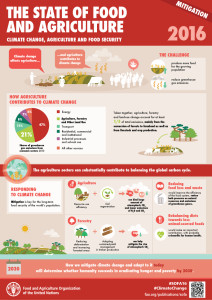Climate Change, Poverty, and Overcoming Business as Usual
Oct 20th, 2016 | By admin | Category: Food and Hunger/AgricultureBy Suzanne York.
Amazingly, but perhaps not surprisingly, climate change has been barely mentioned in the U.S. presidential elections. This, despite the fact that 2016 is likely to be the hottest year on record.
Fortunately, the leaders of other countries seem to have a better handle on it. A landmark international climate agreement was agreed to last week in Rwanda, aiming to phase out hydrofluorocarbons, or HFC’s (including the U.S.).
Notably, many African negotiators accepted a more challenging and ambitious HFC phase out timetable, as they understand that their respective countries are already feeling the effects of climate disruption. Rwanda’s minister of natural resources said, “We are witnessing disastrous droughts — our people are losing lives. We need to address climate change if we are to address poverty.” Being on the frontlines of climate change motivates them to address the problems now, not some time down the road.
“No Time to Waste”
Earlier this week the Food & Agriculture Organization released a report titled The State of Food and Agriculture 2016. In it, they warn that a “business as usual” approach could put millions more people at risk of hunger compared to a future without climate change.
Calling climate change “a major and growing threat to global food security,” the FAO reported it could increase the global population living in extreme poverty by between 35 and 122 million by 2030.
The FAO noted that “most affected would be populations in poor areas in sub-Saharan Africa and South and Southeast Asia, especially those who rely on agriculture for their livelihoods. Future food security in many countries will worsen if no action is taken today.”
Agriculture accounts for a fifth or global greenhouse emissions. Yet most people from developing countries contribute little in the way of carbon emissions, as compared to developed countries.
Yet another recently released report, by the UN Department of Economic and Social Affairs (DESA), found that “evidence is increasing that climate change is taking the largest toll on poor and vulnerable people, and these impacts are largely caused by inequalities that increase the risks from climate hazards.”
Among those hardest hit by climate impacts are women, who make up 70 percent of the world’s one billion poorest people and up to 80 percent of refugees and displaced people.
UN Secretary-General Ban Ki-moon said, “We have no time to waste – and a great deal to gain – when it comes to addressing the socioeconomic inequalities that deepen poverty and leave people behind.”
Supporting Women and Smallholder Farmers
One solution put forth by the FAO is to help smallholder producers adapt to climate change risks, which is critical for reducing global poverty and improving food security. “More resilient agriculture sectors and intelligent investments into smallholder farmers can deliver transformative change,” according to the FAO, “and enhance the prospects and incomes of the world’s poorest while buffering them against the impacts of climate change.”
Encouragingly, the FAO report recognizes the important contribution agroecology can contribute to coping with climate change and empowering communities. Agroecology builds upon the traditional knowledge of family-based farmers and encompasses basic ecological principles for planning and managing sustainable agricultural systems, and tapping into traditional knowledge, and help increase food security.
![Women who are part of Sahyog Sansthan in Rajasthan, India [photo: http://www.idex.org/blog/tag/sahyog-sansthan/]](http://populationgrowth.org/wp-content/uploads/2016/10/Rajasthan-300x151.jpg)
Women who are part of Sahyog Sansthan in Rajasthan, India [photo: http://www.idex.org/blog/tag/sahyog-sansthan/]
Women are the primary caretakers of their families and of managing natural resources. By empowering them with property rights, education, health and reproductive rights, economic opportunities and decision-making authority, the end result will be families, communities, and local environments that are better off and more resilient in the face of increasing global challenges.
José Graziano da Silva, Director-General of the FAO, correctly stated that “‘Business as usual’ is not an option.” We know what needs to be done, and there are many policies that can be implemented today, if only the political will can be found.
Suzanne York is Project Director of Transition Earth.

![[photo: FAO]](http://populationgrowth.org/wp-content/uploads/2016/10/argriculture-climate-change-drought-flood-disaster_crop1448546959694.jpg_1718483346-300x170.jpg)
